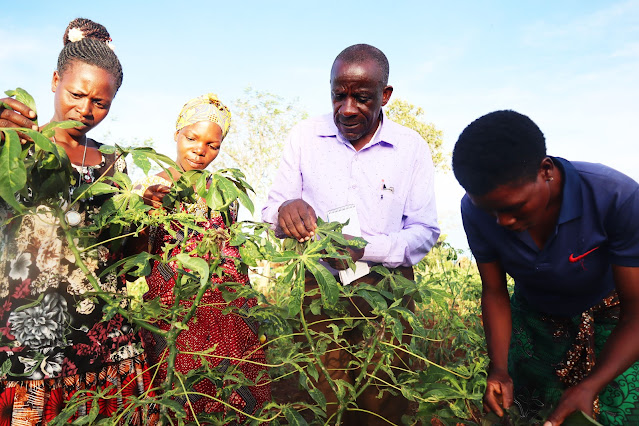A Project Empowers Over 6,500 Smallholder Cassava Farmers To Recover From Economic Effect Of COVID 19
By STAFF REPORTER
RECOVERING from the economic effects propelled by the COVID 19 pandemic has not been an easy task among the smallholder farmers, micro, small as well as medium scale agro enterprises in Tanzania.
The ongoing challenge of climate change has continued to witness most of the small-scale farmers across the country realizing poor harvest, prompting more economic woes on their side.
To that end, the International Institute of Tropical Agriculture (IITA) is bridging efforts with the Tanzania Agricultural Research Institute (TARI) and Alliance of Diversity International and the International Center for Tropical Agriculture (CIAT) in the implementation of a robust project which majors to the smallholder cassava farmers in the semi-arid and drought-prone areas to recover from economic loss from the Covid- 19 pandemic and climate change.
With the financial auspicious from the Ministry of Finance of the People's Republic of China through International Fund for Agricultural Development (IFAD)- South-South and Triangular Cooperation Facility, funded a two-year initiative which has so far benefited at least 6,500 smallholder cassava farmers from three regions of Mwanza, Morogoro and Geita.
Dubbed ‘Supporting and Strengthening Community Resilience in Tanzania (SSUCORETA)’ the timely project eye to strengthen smallholder cassava farmer’s community resilience, markets, and trade development among the targeted farmers.
In implementing the project, agricultural pundits from TARI are responsible to impart the field facilitators with the hands- on orientation over the recommended agronomic practices necessary in growing the tuber crop, as well as in pest and disease management using digital tools namely A-Kilimo and Plant Village Nuru.
Innocent Ndyetabula, a cassava scientist from TARI Ukiriguru in Mwanza region informed SemaTvmedia Blog that the well-trained 120 field facilitators were promoting at least six high-yielding, drought resistance and market-suitable varieties through awareness campaigns in over 123 villages and application of best practices at village level.
Together with that, he added, through the initiative, the beneficiaries farmers were also capacitated with the much- needed post-harvest management practices.
Before the inception of the project, he added, most of the cassava farmers used to dry their cassava tubers on bare ground, the poor practice which caused contamination of different cassava - prone diseases hence reducing prices at the market.
Ndyetabula said the project has set up a network of cassava producers linked via aggregators to the Kipipa Millers for production of high-quality cassava flour, being part to attain additional value for the cassava.
To ensure the farmers are standing on a better side to professionally process the cassava chips on their own shadow, he unveiled that the project was freely rolling out cassava chipping (processing) machines to its beneficiaries.
"For instance, Lake Zone region has become the major trading hub for dried cassava chips with at least 66 higher level aggregators trained on improved post-harvest management and marketing linkages and they are supplying the products sourced from smallholder farmers to neighboring counties of DRC Congo, Rwanda, Burundi, South Sudan and Uganda," he added.
On his side, the project's coordinator, Lembris Laizer said to ensure the farmers produce digitally, they have adopted Kobo Toolbox Application to track and document project beneficiaries adopting good agronomic practices and marketing information.
According to him, the modern system was playing a meaningful role in assisting the field facilitators to cheat challenges in collecting data of the beneficiaries who are scattered in over 15 districts, wards, villages and sub- villages.
"Among the other key digital tools we're using incorporate the Cassava Seed Tracker, Plant Village Nuru and A -Kilimo," he said, adding that the digital tools can easily be accessed in the Google store or App store using smart phones.
And he detailed: "Seed Tracker, which is managed by the Tanzania Official Seeds Certification Institute (TOSCI) is for real-time tracking of cassava production, including pre-planting, registration of seed fields, crop management, harvesting, quality assessment and quality,"
According to Laizer, Plant Village Nuru application uses a digital assistant to help farmers diagnose crop disease in their fields, whereby A KILIMO is an agronomic advisory service developed for and with smallholder farmers for cassava production.
The project has also tracked the sale of cassava planting materials and reported that the sale of cassava seed increased from 67.9m/- million in 2021 to 117.1m/' in 2023, with more sales expected between November and December.
Some of the smallholder cassava growers that benefit from the IITA’s SSUCORETA project display healthier cassava tubers that they managed to harvest after being empowered on good agronomic practices.



Comments
Post a Comment